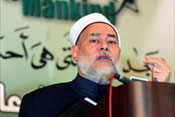اضيف الخبر في يوم السبت ١٢ - يناير - ٢٠٠٨ ١٢:٠٠ صباحاً. نقلا عن: Afaaq

Grand Mufti of Egypt Rules that the Mentally Disabled may Marry
Dr. Ali Gomaa, Mufti of the Arab Republic of Egypt, has issued a fatwa finding that the mentally handicapped are permitted to marry under Islamic law. Representatives of social services agencies and the medical profession have offered caveats, suggesting that the answer to the question whether the mentally handicapped should marry depends on the degree of mental disability, and suggesting that it would be better if such marriages did not produce children. [Full Story in Arabic]
- The Persecution of Egypt’s Coptic Christians Continues
- The straw that may break Egypt's back
- The right of Muslim woman to marry non- Muslim man Answering many fatwas
- Muslim Women Can Marry Peaceful Non-Muslim Men
- Because his Mother is an Israeli Jewish Woman, he Cannot Marry my Daughter!
- Rules, Rules, and more Rules
- May God Rest the Soul of our Deceased Relative, Mr. Ramadan Abdel-Rahman Ali, who Was among the Pioneer Writers of our Quranism Website
- A Message from A Reader – May the Almighty Lord God Bless him
- Message d’un Copte au Mufti d’Egypte et au Cheikh Al-Azhar en Egypte
As reported in the newspaper "Al-Masry Al-Youm,” Gomaa said “it is the right of the mentally handicapped to marry as long as the conditions for marriage are present, and since the Islamic shari`ah permits the marriage of an insane man and an insane woman, thereby the marriage of a mentally disabled man with a mentally disabled women is permissible even more so...." The mufti noted that the care of the mentally disabled is often a burden on their parents and families, and that marriage may have psychological, health and even material benefits for the disabled.
He said: "... marriage is one thing, and procreation is another. Marriage involves intimacy, mercy, friendship, cooperation, creating of new bonds, and much that is sublime, and if reproduction were necessary and obligatorily associated with marriage, then what of the barren and the sterile ... not procreating, or delaying, or limiting, according to each individual situation.''
In his comments on the fatwa, Mustafa Kamal, an official of the National Disability Council for Childhood and Motherhood , notes it is difficult to adopt a single position or fatwa on the permissibility of marriage by the mentally disabled due to the fact that there are many degrees of disability. There are those whose minor state of impairment permits their marrying, and again there are those whose mental disability absolutely rules out marriage.
"In the case of marriage by the mentally disabled,'' Kamal said, ''it is preferable that they not have children. If necessary there should be controls on reproduction so that need not fear a second mentally disabled generation.'' He added: ''There are premarital tests and tests during pregnancy, and it is possible to clarify whether the embryo will be mentally disabled. In the case where two mentally disabled persons marry, there needs to be someone to take care of both of them."
Dr. Adel Ashour, a professor of pediatrics and genetics at the National Center for Research, explained that there are degrees of mental impairment – mild, medium, profound, and serious. Only those whose degree of impairment is ''mild'' are suited for marriage, in his view, and the marriage should be under the oversight of the family. Two seriously mentally disabled persons may not marry. He added that it was fortunate that most of those who are born with mental disabilities also have reproductive defects, but that, because abortion is not legal, some of them do give birth to deformed children.
دعوة للتبرع
الولدان المخلدون: عليكم قرأت في مقالا ت الدكت ور منصور عن...
هذا التخلف السُّنّى: يصعب علي ما تذهبو ن إليه كيف نترك الحدي ث ...
حجة: لفت نظرى إستشه ادك بالآي ة 83 و 149 عن الحجة...
اذان ونداء: ما الفرق بين الآذا ن (وأذن في الناس بالحج ) ...
الشفعة: هل يدخل تشريع الفقه اء للشفع ة ضمن...
more
